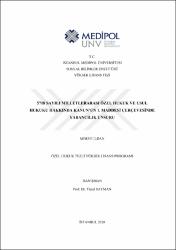| dc.contributor.advisor | Sayman, Yücel | |
| dc.contributor.author | İldan, Merve | |
| dc.date.accessioned | 2021-08-17T11:11:52Z | |
| dc.date.available | 2021-08-17T11:11:52Z | |
| dc.date.issued | 2020 | en_US |
| dc.date.submitted | 2020-01-17 | |
| dc.identifier.citation | İldan, M. (2020). 5718 sayılı Milletlerarası Özel Hukuk ve Usul Hukuku Hakkında Kanun'un 1. maddesi çerçevesinde yabancılık unsuru. (Yayınlanmamış yüksek lisans tezi). İstanbul Medipol Üniversitesi Sosyal Bilimler Enstitüsü, İstanbul. | en_US |
| dc.identifier.uri | https://hdl.handle.net/20.500.12511/7834 | |
| dc.description.abstract | Yabancılık unsuru, milletlerarası özel hukuku özel hukukun diğer alt dallarından ayıran ve aslında onun bir hukuk dalı olarak ortaya çıkmasına sebep olan unsurdur. Bir ilişki yabancılık unsuru taşıyorsa milletlerarası özel hukukun uygulama alanına girecek ve söz konusu ilişkiye birden fazla hukukun uygulanabilme ihtimali gündeme gelecektir. Yabancılık unsuru taşıyan ilişkiye söz konusu hukuklardan hangisinin uygulanacağı ise bağlama kuralları aracılığıyla belirlenecektir. O halde yabancılık unsuru uygulanacak hukuk bakımından önem arz eden ve bağlama kurallarını harekete geçiren bir kavramdır. Bu husus, hukuk seçimi ve yabancı bir devlet mahkemesini yetkilendiren yetki sözleşmelerinin bir ilişkiyi yabancılık unsurlu hale getirip getirmeyeceği konusunda da göz önünde bulundurulmalıdır. Belirtelim ki, teknoloji alanında yaşanan gelişmeler ve iletişimin artmasıyla beraber yabancılık unsuru taşıyan ilişkilerin sayısı da her geçen gün artmakta ve bu doğrultuda milletlerarası özel hukuka gün geçtikçe daha fazla ihtiyaç duyulmaktadır. Bu sebeple milletlerarası özel hukukun temeli olan yabancılık unsuru kavramından ne anlaşılacağının ortaya konulması gerekmektedir. Öte yandan Türk mahkemelerinin milletlerarası yetkisi ve yabancı mahkeme ile yabancı hakem kararlarının tanınması ve tenfizi meseleleri açısından ilişkinin yabancılık unsurlu olup olmadığı önem taşımamaktadır. Bu duruma ilişkin çeşitli gerekçelerden bahsedilebilecek olmakla birlikte, yabancılık unsurunun ilişkiye hangi ülke hukukunun uygulanacağı sorusunu sorduran ve bağlama kurallarını tetikleyen bir işlevi olduğu, buna karşılık ilişkiden doğan uyuşmazlığın başka bir devlet yargısında görülmesini gündeme getiren bir yönünün bulunmadığı ilk akla gelen gerekçedir. | en_US |
| dc.description.abstract | The element of foreignness is the key factor that distinguishes international private law from other sub-branches of private law and it is the very reason that causes the emergence of International Private Law as a different branch of law. If a relationship contains a foreign element, it will fall into the scope of international private law and it will create the possibility to apply more than one states' law to this relationship. Connecting factors will determine the applicable law to the relation that contains a foreign element. Therefore, the foreign element is an important concept in terms of the applicable law and activates the connecting factors. This issue should also be taken into account whether the choice of law and the jurisdiction agreements that authorize a foreign state's court could make a relationship foreign. It should be noted that, due to the developments of technology and the rise of communication, the number of foreign relations is increasing day by day and international private law is increasingly needed. For this reason, it is necessary to clarify what will be understood from the concept of a foreign element, which is the basis of international private law. On the other hand, it is not important whether the relationship has a foreign element in terms of the international jurisdiction of the Turkish courts and the recognition and enforcement of the foreign court's and the foreign arbitrator's judgments. Although the situation can be explained with various reasons, the first reason that comes to mind is that the foreign element has the function to question which country's law is applicable to the relationship and to trigger the connecting factors, whereas it does not bring into question which state's court will be entitled to have the judgment on the conflict arising from the relationship. | en_US |
| dc.language.iso | tur | en_US |
| dc.publisher | İstanbul Medipol Üniversitesi Sosyal Bilimler Enstitüsü | en_US |
| dc.rights | info:eu-repo/semantics/openAccess | en_US |
| dc.subject | Yabancılık Unsuru | en_US |
| dc.subject | Uygulanacak Hukuk | en_US |
| dc.subject | Hukuk Seçimi | en_US |
| dc.subject | Türk Mahkemelerinin Milletlerarası Yetkisi | en_US |
| dc.subject | Yetki Sözleşmesi | en_US |
| dc.subject | Tanıma-Tenfiz | en_US |
| dc.subject | Yabancı Mahkeme Kararı | en_US |
| dc.subject | Yabancı Hakem Kararı | en_US |
| dc.subject | Foreign Element | en_US |
| dc.subject | Applicable Law | en_US |
| dc.subject | Choice of Law | en_US |
| dc.subject | International Jurisdiction of Turkish Courts | en_US |
| dc.subject | Jurisdiction Agreements | en_US |
| dc.subject | Recognition and Enforcement | en_US |
| dc.subject | Foreign Court’s Judgment | en_US |
| dc.subject | Foreign Arbitrator’s Judgment | en_US |
| dc.title | 5718 sayılı Milletlerarası Özel Hukuk ve Usul Hukuku Hakkında Kanun'un 1. maddesi çerçevesinde yabancılık unsuru | en_US |
| dc.title.alternative | Foreign element under the International Private and Civil Procedure Law No: 5718 art. 1 | en_US |
| dc.type | masterThesis | en_US |
| dc.department | İstanbul Medipol Üniversitesi, Sosyal Bilimler Enstitüsü, Özel Hukuk Ana Bilim Dalı | en_US |
| dc.relation.publicationcategory | Tez | en_US |


















